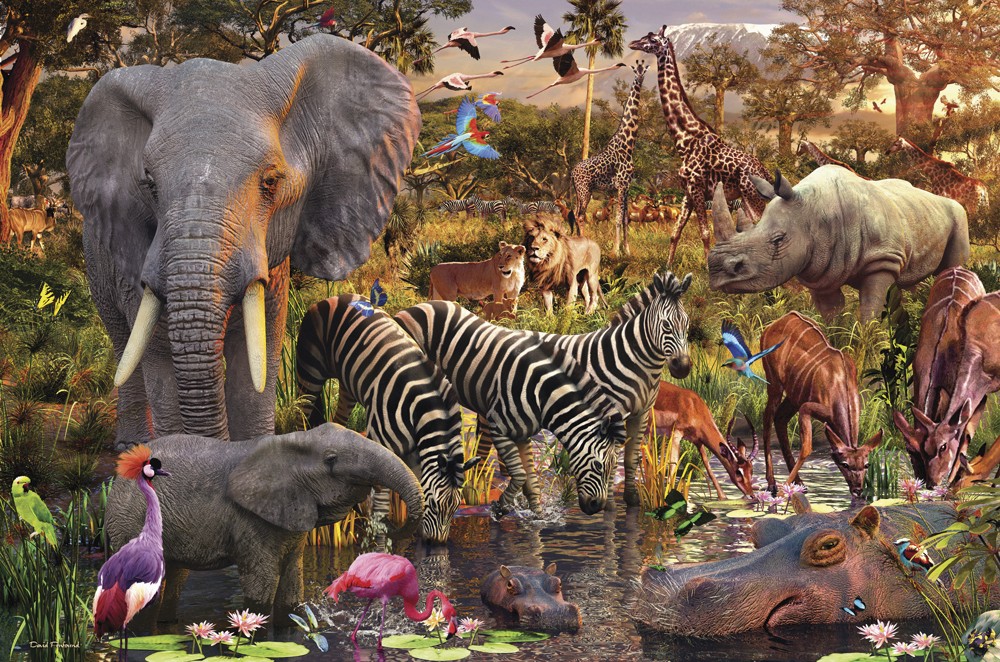 Animals are multicellular, eukaryotic organisms of the kingdom animalia (also called Metazoa). All animals are motile, meaning they can move spontaneously and independently at some point in their lives. Their body plan eventually becomes fixed as they develop, although some undergo a process of metamorphosis later on in their lives. All animals are heterotrophs: they must ingest other organisms or their products for sustenance.
Animals are multicellular, eukaryotic organisms of the kingdom animalia (also called Metazoa). All animals are motile, meaning they can move spontaneously and independently at some point in their lives. Their body plan eventually becomes fixed as they develop, although some undergo a process of metamorphosis later on in their lives. All animals are heterotrophs: they must ingest other organisms or their products for sustenance.Senin, 31 Oktober 2016
What is pond wildlife? The Garden Pond Blog
 Animals are multicellular, eukaryotic organisms of the kingdom animalia (also called Metazoa). All animals are motile, meaning they can move spontaneously and independently at some point in their lives. Their body plan eventually becomes fixed as they develop, although some undergo a process of metamorphosis later on in their lives. All animals are heterotrophs: they must ingest other organisms or their products for sustenance.
Animals are multicellular, eukaryotic organisms of the kingdom animalia (also called Metazoa). All animals are motile, meaning they can move spontaneously and independently at some point in their lives. Their body plan eventually becomes fixed as they develop, although some undergo a process of metamorphosis later on in their lives. All animals are heterotrophs: they must ingest other organisms or their products for sustenance.Download Wild Lion Live HD Wallpaper for Android by Shurav Liolega
Wild Night quot; is a song by Bon Jovi from their 2001 live album One Wild
This common sun skink is much larger and not quite as accomodating.
Types Of Wild Cats: Wild Cat Species In The World
million species of animals and plants that live in the rainforest
Beautiful African Animals Safaris: Endangered Beautiful African Safari
 Animals are multicellular, eukaryotic organisms of the kingdom animalia (also called Metazoa). All animals are motile, meaning they can move spontaneously and independently at some point in their lives. Their body plan eventually becomes fixed as they develop, although some undergo a process of metamorphosis later on in their lives. All animals are heterotrophs: they must ingest other organisms or their products for sustenance.
Animals are multicellular, eukaryotic organisms of the kingdom animalia (also called Metazoa). All animals are motile, meaning they can move spontaneously and independently at some point in their lives. Their body plan eventually becomes fixed as they develop, although some undergo a process of metamorphosis later on in their lives. All animals are heterotrophs: they must ingest other organisms or their products for sustenance. The word "animal" comes from the Latin animalis, meaning having breath, having soul or living being. In everyday non-scientific usage the word excludes humans – that is, "animal" is often used to refer only to non-human members of the kingdom Animalia; often, only closer relatives of humans such as mammals and other vertebrates, are meant. The biological definition of the word refers to all members of the kingdom animalia, encompassing creatures as diverse as sponges, jellyfish, insects, and humans.
The word "animal" comes from the Latin animalis, meaning having breath, having soul or living being. In everyday non-scientific usage the word excludes humans – that is, "animal" is often used to refer only to non-human members of the kingdom Animalia; often, only closer relatives of humans such as mammals and other vertebrates, are meant. The biological definition of the word refers to all members of the kingdom animalia, encompassing creatures as diverse as sponges, jellyfish, insects, and humans.Horse Picture – Animal Wallpaper – National Geographic Photo of
Wild Kratts LIVE on Tour and in Windsor! Maple Leaf Mommy

Maxi Priest Wild world live YouTube
Tags:Wild Wolf Live HD Wallpaper,fun,photo,images,pics,screenshots
Wild Liveforever photo Tim Lyons photos at pbase.com
Pressuridion: National Geographic Photo of the day July 25, 2012
Wild Live Animals Poster Stock Vector Image: 52469177
wildlifepic
Wild Live Zivil Outfit own creation
Minggu, 30 Oktober 2016
LIVE THE WILD LIFE TV OFFERS SOME OF THE BEST HUNTING AND FISHING
Mississippi Flood Pictures: Pets, Wild Animals Seek Safety
1989 death or glory live 1989 live in düsseldorf 1989
Live And The Crowd Went Wild is a compilation album of live songs by

NIGHT MOVES: Wildlife Selfies on Hidden Camera Live in Oakland
 Thank You for Visiting this Article
Thank You for Visiting this Article
Sabtu, 29 Oktober 2016
Map: Wild turkey range
do wild animals live in your state? Is there less or more wildlife
Where do wild pigs live? Ask.com
Henry and Alice: Into The Wild « Globe Theatre
Victory! 18 Wild Horses Saved From Slaughterhouse One Green Planet
Where The Wild Horses Live by Deborah Hall Barry
Can Fake Fur Save This Leopard? Photo: U.S. Fish amp; Wildlife Service
Siberian Tigers Trained To Live In Wild
Live Webcam featuring Wild Boar in Estonia
Pictures: Animals Inherit Mixed Legacy at Chernobyl
Wild Kratts—Live! YouTube
 Animals are multicellular, eukaryotic organisms of the kingdom animalia (also called Metazoa). All animals are motile, meaning they can move spontaneously and independently at some point in their lives. Their body plan eventually becomes fixed as they develop, although some undergo a process of metamorphosis later on in their lives. All animals are heterotrophs: they must ingest other organisms or their products for sustenance.
Animals are multicellular, eukaryotic organisms of the kingdom animalia (also called Metazoa). All animals are motile, meaning they can move spontaneously and independently at some point in their lives. Their body plan eventually becomes fixed as they develop, although some undergo a process of metamorphosis later on in their lives. All animals are heterotrophs: they must ingest other organisms or their products for sustenance. Most known animal phyla appeared in the fossil record as marine species during the Cambrian explosion, about 542 million years ago. Animals can be divided broadly into vertebrates and invertebrates. Vertebrates have a backbone or spine (vertebral column), and amount to less than five percent of all described animal species. They include fish, amphibians, reptiles, birds and mammals. The remaining animals are the invertebrates, which lack a backbone. These include molluscs (clams, oysters, octopuses, squid, snails); arthropods (millipedes, centipedes, insects, spiders, scorpions, crabs, lobsters, shrimp); annelids (earthworms, leeches), cnidarians (jellyfish, sea anemones, corals), and sponges. The study of animals is called zoology.
Most known animal phyla appeared in the fossil record as marine species during the Cambrian explosion, about 542 million years ago. Animals can be divided broadly into vertebrates and invertebrates. Vertebrates have a backbone or spine (vertebral column), and amount to less than five percent of all described animal species. They include fish, amphibians, reptiles, birds and mammals. The remaining animals are the invertebrates, which lack a backbone. These include molluscs (clams, oysters, octopuses, squid, snails); arthropods (millipedes, centipedes, insects, spiders, scorpions, crabs, lobsters, shrimp); annelids (earthworms, leeches), cnidarians (jellyfish, sea anemones, corals), and sponges. The study of animals is called zoology.and Information About Wildlife and Animal Life and Survival in Africa

When is Wild Kratts LIVE! coming to the Upstate?
Animals in Alaska, Wild Animals That Live In Alaska, Animals of Alaska
Get tickets to see WILD KRATTS – LIVE coming to LA and San Diego in
Langganan:
Komentar (Atom)